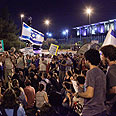
Moving beyond security issues
צילום: נועם מושקוביץ
Tent protest lessons
Op-ed: Latest strings of protests in Israel a harbinger of new normalcy in Jewish state
Over the last number of months Israel has been feeling like a normal country. Citizens have boycotted cottage cheese, doctors have been striking for a restructuring of their salaries, and now tent cities are sprouting up all over Israel in protest of the lack of affordable housing. All this while, a few Qassam rockets have fallen, and there still remains the “minor issue” of September, and the UN vote on Palestinian statehood. It has even been reported that Iranian president Ahmadinejad is debating a policy of publicly pursuing a nuclear weapon.
What is remarkable is that in the midst of these “minor” existential challenges, Israelis have found the room not only to worry about the question of whether we will be, but who we want to be, and what kind of a society we want to have. These last few months are the greatest sign of Israel’s power and success. While our neighborhood has not miraculously relocated to North America or Western Europe, and is still a profoundly dangerous place, Israelis are beginning to move beyond a singular preoccupation with the crisis of survival. These are the harbingers of a new normalcy.
Jewish sovereignty is not expressed merely in national independence for the Jewish people, but in the opportunity for the Jewish people to shape our own society in accordance with the values and ideals of our people and traditions. It is about creating a society of value, grounded on a politics of values. It is about moral aspirations meeting the public marketplace and inspiring the creation of a new reality.
The Israeli government can look at the various civic protests over the last few months as localized challenges that need ad hoc political solutions. It might even lead to the “solving of the problem” through the firing of the finance minister, or the minister in charge of cottage cheese. Once we know whom to blame, we can continue along our merry way. Or we can ask ourselves what are the moral challenges being raised and how do we systemically respond.
Tomorrow has come
Much of Israel’s economic and military success over the last decade has resulted from the decentralization of our economic structure and the allowing of a less regulated and freer economic system steered by market forces. In one sense everyone has gained as the standard of living has risen dramatically. At the same time, however, it has created a new poor, a poor which in dollars and cents terms is not worse off than before, but which in psychological terms finds itself at best unable to meet and maintain the new standard of needs to which our society has become accustomed.The prosperity of Israel both necessitates and affords us the luxury of asking anew questions of the individual’s rights and needs and the role of society therein. One of the important lessons of our tradition is that one needs to take into account both objective and subjective needs. As we learn in the Talmud, objective needs include food, shelter, clothing, and the ability to have and sustain a family. The objective needs also include the right to dignity. Needs and dignity, however, also are subjective, and it is incumbent upon a society to make room for this subjectivity in its aspiration to set a just distribution of its resources. (Tractate Ketubot 67b)
The obligation of sovereignty and the dividend of prosperity require us not only to ensure that we meet peoples’ basic needs but also ask ourselves both what a person needs in order to live a life of dignity and what we must do as a society in order to ensure that this dignity is the inheritance of all. As we race forward we must ensure that we not only refrain from leaving people behind but that the values of care, compassion, and consideration which we exhibit toward each other on the battlefield define our marketplace as well.
The recent internal events in Israel are an indication that some of these values are missing and that a larger conversation of this type is long overdue. For many years the rejoinder was, “We’ll deal with these questions tomorrow, for today we have more pressing concerns.” In the history of Israel, it is time to officially recognize that tomorrow has come, and whether we will be an aspirational and values nation is both the challenge and opportunity of the day.
Rabbi Dr. Donniel Hartman is president of the Shalom Hartman Institute in Jerusalem, Israel
- Follow Ynetnews on Facebook










